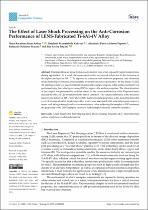 ResearchSpace
ResearchSpace
The effect of laser shock processing on the anti-corrosion performance of LENS-Fabricated Ti-6Al-4V alloy
JavaScript is disabled for your browser. Some features of this site may not work without it.
- ResearchSpace
- →
- Research Publications/Outputs
- →
- Journal Articles
- →
- View Item
| dc.contributor.author |
Arthur, Nana KK

|
|
| dc.contributor.author |
Kubjane, SM

|
|
| dc.contributor.author |
Popoola, API

|
|
| dc.contributor.author |
Masina, Bathusile N

|
|
| dc.contributor.author |
Pityana, Sisa L

|
|
| dc.date.accessioned | 2024-03-19T07:13:11Z | |
| dc.date.available | 2024-03-19T07:13:11Z | |
| dc.date.issued | 2023-05 | |
| dc.identifier.citation | Arthur, N.K., Kubjane, S., Popoola, A., Masina, B.N. & Pityana, S.L. 2023. The effect of laser shock processing on the anti-corrosion performance of LENS-Fabricated Ti-6Al-4V alloy. <i>Journal of Composites Science, 7(6).</i> http://hdl.handle.net/10204/13636 | en_ZA |
| dc.identifier.issn | 2504-477X | |
| dc.identifier.uri | https://doi.org/10.3390/jcs7060218 | |
| dc.identifier.uri | http://hdl.handle.net/10204/13636 | |
| dc.description.abstract | Titanium alloys are prone to increased oxidation rates when exposed to higher temperatures during application. As a result, the components suffer mechanical failure due to the formation of the alpha-case layer at 500 °C. To improve its corrosion and oxidation properties, and ultimately its mechanical performance, it is necessary to modify its surface properties. In this study, a LENS 3D-printing system was used to fabricate titanium alloy sample coupons, while surface treatment was performed using laser shock processing (LSP) to improve the surface properties. The characterisation of the samples was performed to establish a basis for the corrosion behaviour of the 3D-printed material and the effect of LSP treatment on the rate of corrosion. The samples fabricated at the moderate laser energy density of 249 J/mm3 showed the best-performing properties as the microstructures that evolved showed elevated hardness profiles, which were associated with material property improvements such as high strength and corrosion resistance. After subjecting the samples to LSP treatment, the properties of the LENS samples showed a further improvement in corrosion resistance. | en_US |
| dc.format | Fulltext | en_US |
| dc.language.iso | en | en_US |
| dc.relation.uri | https://www.mdpi.com/2504-477X/7/6/218 | en_US |
| dc.source | Journal of Composites Science, 7(6) | en_US |
| dc.subject | Laser Engineered Net Shaping | en_US |
| dc.subject | Laser shock peening | en_US |
| dc.subject | Microstructure | en_US |
| dc.subject | Oxidation behaviour | en_US |
| dc.subject | Surface roughness | en_US |
| dc.subject | Titanium alloy | en_US |
| dc.title | The effect of laser shock processing on the anti-corrosion performance of LENS-Fabricated Ti-6Al-4V alloy | en_US |
| dc.type | Article | en_US |
| dc.description.pages | 17pp | en_US |
| dc.description.note | Copyright: © 2023 by the authors. Licensee MDPI, Basel, Switzerland. This article is an open access article distributed under the terms and conditions of the Creative Commons Attribution (CC BY) license (https://creativecommons.org/licenses/by/4.0/) | en_US |
| dc.description.cluster | Manufacturing | en_US |
| dc.description.impactarea | Laser Enabled Manufacturing | en_US |
| dc.identifier.apacitation | Arthur, N. K., Kubjane, S., Popoola, A., Masina, B. N., & Pityana, S. L. (2023). The effect of laser shock processing on the anti-corrosion performance of LENS-Fabricated Ti-6Al-4V alloy. <i>Journal of Composites Science, 7(6)</i>, http://hdl.handle.net/10204/13636 | en_ZA |
| dc.identifier.chicagocitation | Arthur, Nana KK, SM Kubjane, API Popoola, Bathusile N Masina, and Sisa L Pityana "The effect of laser shock processing on the anti-corrosion performance of LENS-Fabricated Ti-6Al-4V alloy." <i>Journal of Composites Science, 7(6)</i> (2023) http://hdl.handle.net/10204/13636 | en_ZA |
| dc.identifier.vancouvercitation | Arthur NK, Kubjane S, Popoola A, Masina BN, Pityana SL. The effect of laser shock processing on the anti-corrosion performance of LENS-Fabricated Ti-6Al-4V alloy. Journal of Composites Science, 7(6). 2023; http://hdl.handle.net/10204/13636. | en_ZA |
| dc.identifier.ris | TY - Article AU - Arthur, Nana KK AU - Kubjane, SM AU - Popoola, API AU - Masina, Bathusile N AU - Pityana, Sisa L AB - Titanium alloys are prone to increased oxidation rates when exposed to higher temperatures during application. As a result, the components suffer mechanical failure due to the formation of the alpha-case layer at 500 °C. To improve its corrosion and oxidation properties, and ultimately its mechanical performance, it is necessary to modify its surface properties. In this study, a LENS 3D-printing system was used to fabricate titanium alloy sample coupons, while surface treatment was performed using laser shock processing (LSP) to improve the surface properties. The characterisation of the samples was performed to establish a basis for the corrosion behaviour of the 3D-printed material and the effect of LSP treatment on the rate of corrosion. The samples fabricated at the moderate laser energy density of 249 J/mm3 showed the best-performing properties as the microstructures that evolved showed elevated hardness profiles, which were associated with material property improvements such as high strength and corrosion resistance. After subjecting the samples to LSP treatment, the properties of the LENS samples showed a further improvement in corrosion resistance. DA - 2023-05 DB - ResearchSpace DP - CSIR J1 - Journal of Composites Science, 7(6) KW - Laser Engineered Net Shaping KW - Laser shock peening KW - Microstructure KW - Oxidation behaviour KW - Surface roughness KW - Titanium alloy LK - https://researchspace.csir.co.za PY - 2023 SM - 2504-477X T1 - The effect of laser shock processing on the anti-corrosion performance of LENS-Fabricated Ti-6Al-4V alloy TI - The effect of laser shock processing on the anti-corrosion performance of LENS-Fabricated Ti-6Al-4V alloy UR - http://hdl.handle.net/10204/13636 ER - | en_ZA |
| dc.identifier.worklist | 27368 | en_US |





